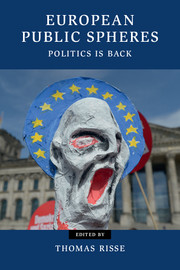Book contents
- Frontmatter
- Contents
- List of figures
- List of tables
- List of contributors
- Preface
- 1 Introduction
- Part I How to grasp the Europeanization of public spheres: theory, methods, empirics
- Part II Consequences: does the Europeanization of public spheres matter?
- 6 European public spheres, the politicization of EU affairs, and its consequences
- 7 Media and identity: the paradox of legitimacy and the making of European citizens
- 8 The restructuring of political conflict in Europe and the politicization of European integration
- Part III Theoretical and normative implications
- Bibliography
- Index
6 - European public spheres, the politicization of EU affairs, and its consequences
Published online by Cambridge University Press: 05 November 2014
- Frontmatter
- Contents
- List of figures
- List of tables
- List of contributors
- Preface
- 1 Introduction
- Part I How to grasp the Europeanization of public spheres: theory, methods, empirics
- Part II Consequences: does the Europeanization of public spheres matter?
- 6 European public spheres, the politicization of EU affairs, and its consequences
- 7 Media and identity: the paradox of legitimacy and the making of European citizens
- 8 The restructuring of political conflict in Europe and the politicization of European integration
- Part III Theoretical and normative implications
- Bibliography
- Index
Summary
At first glance, the euro crisis has brought out the worst stereotypes in the public spheres that Europeans might imagine about one another. Greek street posters depicted German Chancellor Angela Merkel in a Nazi uniform with the European Union (EU) stars around the swastika. A German news magazine portrayed Aphrodite giving the finger with the title “Crooks in the Euro-Family” (note, however, that the Eurozone is still portrayed as a “family”). Europeans appear to fall back into nationalism and to advocate nationalist responses to the worst crisis the EU has ever faced. It is no wonder, then, that former Italian Prime Minister Mario Monti warned about the “psychological breakup of Europe.” Yet, his warnings represented transnational communication because he made his comments in the German magazine Der Spiegel.
There is no doubt that the euro crisis has politicized European affairs and the EU, probably like no other previous event in the history of European integration. How to respond to the euro crisis is being hotly debated across borders. Austerity programs and stringent budget cuts are being proposed (and imposed on the EU’s southern tier), and others advocate (Keynesian) economic-growth strategies to avoid long-lasting recessions and growing unemployment in the Eurozone. At the same time, public-opinion polls reveal that majorities of Europeans agree that European rather than national solutions to the crisis are the best way and that European integration will increase rather than decrease as a result (European Commission 2011).
- Type
- Chapter
- Information
- European Public SpheresPolitics Is Back, pp. 141 - 164Publisher: Cambridge University PressPrint publication year: 2014
- 8
- Cited by

